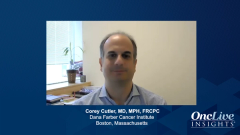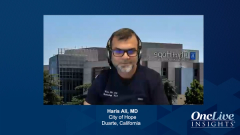
Novel Targeted Agents in GVHD: The FLIGHT and AGAVE-201 Trials
Brief insight on the FLIGHT and AGAVE-201 trials in chronic GVHD, which analyzed itacitinib, a JAK inhibitor, and axatilimab, a CSF1R inhibitor, respectively.
Episodes in this series

Transcript:
Yi-Bin Chen, MD: It's gratifying to see all the industrial interest in our field of chronic graft-versus-host disease [GVHD]. Compared to when I started, the research is much more advanced, which is mostly due to collaboration with industry and investment in our patients, and hopefully, that will translate to overall improved outcomes. There are some ongoing clinical trials, which we're eagerly awaiting the results of. One of these is called FLIGHT and appears to be an investigator-initiated study that's being conducted by colleagues at the University of Utah. The study looks at patients with upfront chronic graft-versus-host disease. For initial therapy, they did not give patients steroids, which is a standard of care, but rather itacitinib, which is a novel oral JAK inhibitor thought to be JAK1 selective with ECP, or extracorporeal photopheresis. ECP is a standard agent or standard modality, in the therapy of chronic graft-versus-host disease for second or later line, many of us employ that it has its logistical challenges. Itacitinib is an oral JAK1 selective inhibitor that has been the subject of several clinical trials in this space. We know how to use itacitinib, it’s shown to be fairly safe, but it has its incidence of adverse events, including thrombocytopenia. This clinical trial is a design that many of us have discussed in national consortia, it’s the motivation that steroids are not the best therapy for a large subset of our patients with chronic graft-versus-host disease. If we can either find a system to better stratify patients or if we have better therapies, then we can replace steroids as initial therapy for chronic graft-versus-host disease. I look forward to seeing the results of this; it's a single-arm trial that will hopefully illustrate not only safety, but give us a signal of efficacy of this novel combination for therapy.
Haris Ali, MD: This was the AGAVE-201 study that was presented recently in ASH [American Society of Hematology]. This is a monoclonal antibody that blocks the binding of CSF1 ligand to the CSF1 receptor, and prevents the activation of macrophages that can lead to fibroblasts and fibrosis of the tissue. It was studied in patients who have previously failed all the three approved agents and saw response rates of oral response of 68% in all different sites of organs, it is a very exciting agent and the trials are ongoing.
Transcript edited for clarity.







































